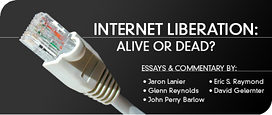You know, I would love to join this discussion in some useful way, particularly since the other designated contributors are all—each in his own way—heroes of mine and, at the least, a group I would love to go to dinner with.
However, starting with Jaron’s essay, and proceeding serenely from that point, we have failed to address directly the topic at hand. This was, unless I’m mistaken: Is the Internet a liberating technological force? Did the “utopian” promise of Cyberspace—as blared by Wired and other cyberoptimists like Nicholas Negroponte and myself back in those foolish ‘90′s—become realized in any useful way or have the “weary giants of flesh and steel” asserted their authority over this new social space without much inconvenience?
Or, to restate the original questions as stated by Cato:
After a solid decade of intense commercial development, much go-go nineties prophesying now seems a triumph of Utopian hope over hard reality. Does hope of Internet liberation yet remain? Or has the bright promise of the Internet been dimmed by corporate influence and government regulation? Are ideas like virtual citizenship beyond the nation-state, untraceable electronic currency, and the consciousness expanding powers of radical interconnectivity defunct? Is there untapped revolutionary power waiting to be unleashed?
I gave a shot at taking up these matters, but my fellows have mysteriously decided to ignore them, except by tangential reference, and quibble instead about the relative virtues of capitalism, whether UNIX and its command-line interface are stultifying to the creation of online community, whether the concept of the “file” is inhibiting, who said what wise thing first and in what way, whether or not manned space travel is a good idea, and various other pronouncements that seem, at best, orthogonal to the questions at issue.
Gentlemen, you disappoint me.
I guess that part of growing up, which I’m still trying to do at an advanced age, is accepting the reality that one’s heros are human, but it strikes me that you fellows are being astonishingly self-indulgent. Coming from me, this is quite a charge, since, as a self-confessed narcissist, I don’t even defend myself when people say I think it’s all about me.
I guess we’ve run out of time, but to the extent we haven’t, might I encourage you to address one question? I want to know whether you think that the Internet is a liberating phenomenon. I still do.

